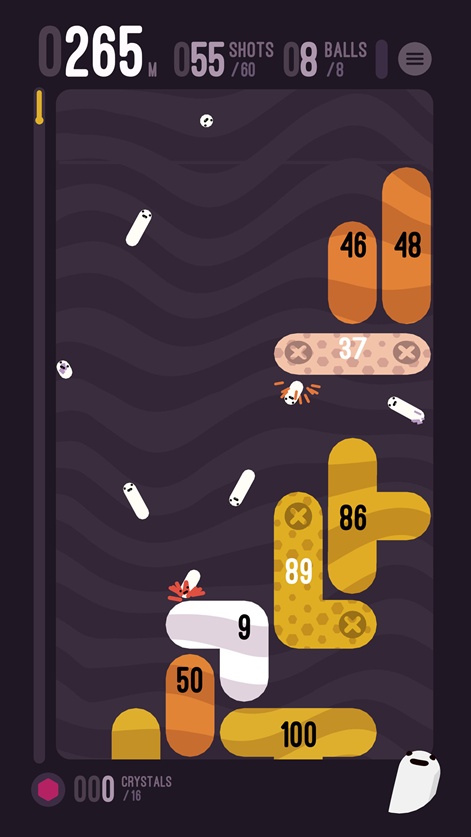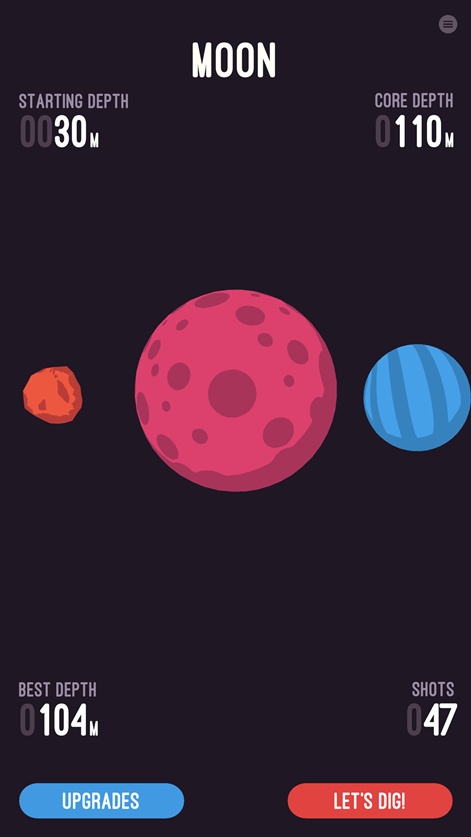Games of the brick breaker mould may have existed since the dawn of the medium itself, but few can claim to offer the same dose of charm and glee that Grapefrukt's Holedown does.
As you pass from planet to planet you’ll be tasked with mining and excavation, with additional tools and unlockables along the way.
Once you land on your chosen planet, the brick breaking begins.
Each brick of rock comes with a numerical value of hits it can take before shattering, and you’ll lose the level should they reach a certain point of height, making it some form of brick breaking Tetris.
Perhaps the most charming aspect of it all is the brick breakers themselves. Rather than the usual ball, Holedown’s rock shattering labour is done by a raft of jolly fellows who look like tic-tacs.
If you’re as big a fan of them as we are you’ll be pleased to know that one sits at the bottom of the screen and sways side-to-side in awe as the game unfolds.
So, for this week’s Indie Spotlight we decided to catch up with Grapefrukt’s one-man band Martin Jonasson to delve into the game's success and his career. Brick by brick, if you will.
PocketGamer.Biz: Can you tell us a bit about yourself and how you got started as an indie games developer?
Martin Jonasson: I've been making games ever since I was a kid, but never really considered it as "a thing to do" until, realistically, the indie boom around 2007 or 2008.
It all got started when I was playing another game with somewhat similar mechanics. Shoot a ball, break bricks. Repeat.Martin Jonasson
That's right when I got out of school and chugged along at various web development agencies and as a freelancer, all the while making games on the side.
This was until I more or less stumbled upon Rymdkapsel, which then became my first commercial game back in 2013. I've been making games full-time ever since.
Holedown has a lot of charm, where did the idea behind it originate for you?
It's a combination of things, it all got started when I was playing another game with somewhat similar mechanics. Shoot a ball, break bricks. Repeat.
It was somehow fascinating to play, but also really dry and sort of quickly made. I decided to try and explore what a game like that could be if it got time to grow.

Fairly quickly it started accumulating elements from elsewhere, like the tetrominoes and upgrade systems.
You’ve done a few puzzle games before, but this is seemingly the first in the brick breaker vein, what inspired that?
I never set out to make any kind of game really, it just sort of happens. I used to make a bunch of quicker prototypes and try and explore what I found there.
Fairly quickly it started accumulating elements from elsewhere, like the tetrominoes and upgrade systems.Martin Jonasson
Nowadays I'm much worse at prototyping quickly, so it's more like a month or three per prototype than my earlier week-or-so speed.
Often times it's a small idea or feeling that eventually leads to the entire game.
What kind of challenges did developing the game throw up? Was there anything unexpected?
Figuring out how to make the levels and generating them took its sweet time to come together.
Once I realised, with the good help of a friend, that rounded corners on the blocks could work and took the time to make it work, I knew I really was onto something.
That and about a hundred various physics glitches that needed special fixing not to happen, as often.
Holedown has gone down well, it seems. What has that been like for you? Did you anticipate the reception it’s gotten?
I somehow managed to not really think too much about how it would be received.

I think that's mostly a coping strategy. I guess my benchmark is twofold, A: do the people I respect seem to like it? And B: did it pay back the time and money I spent?
I've managed to carve out a little niche for myself. I'm not quite sure how that happened, but I'm very fortunate to have it.Martin Jonasson
So far, it's looking really good for both. So I'm very happy.
What is your opinion of the mobile games market for indies right now?
I don't know if it's especially different now than it was a couple of years ago.
It's crowded, it's hard to get noticed and it's top-heavy. The big guys get almost all of the cash.
But somehow, I've managed to carve out a little niche for myself. I'm not quite sure how that happened, but I'm very fortunate to have it.
What're the biggest challenges facing indies right now?
It's easy to go indie but it's way harder to actually sell your game and make a living.
That's as true today as it was ten years ago, the issues have changed. It used to be hard to get your game on a marketplace, now that part's easy.
But, it's easy for everyone, so now it's overcrowded. The problem keeps moving and I have no idea where it'll go next.
What are your plans for the immediate and long-term future?
My immediate future and present involve being on parental leave with my two kids. It's a nice, if somewhat intense, break from game development.
Once I get back properly, I guess I'll make another game? What that will be, I really don't know.
I have a few ideas, but I also know that it's never the ones I think that end up working out.
What advice would you give to other developers on 'making it' as an indie?
A: Don't listen to me, that's for sure.
B: If you're gonna try and "make it", figure out a way to get as long of a runway as you can.
Don't go all in. You're going to need way more time and tries than you think.




















